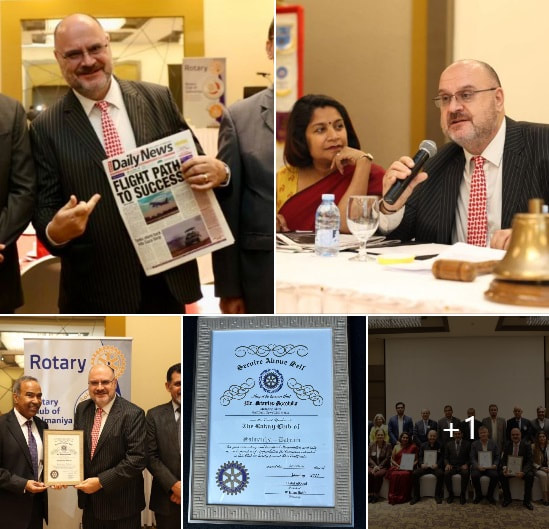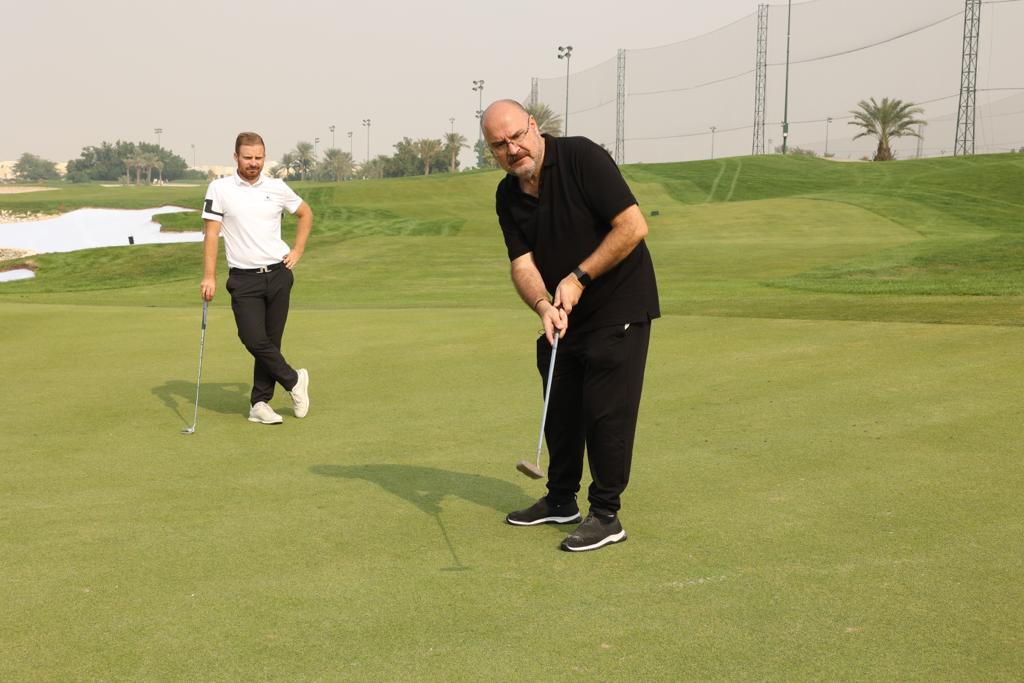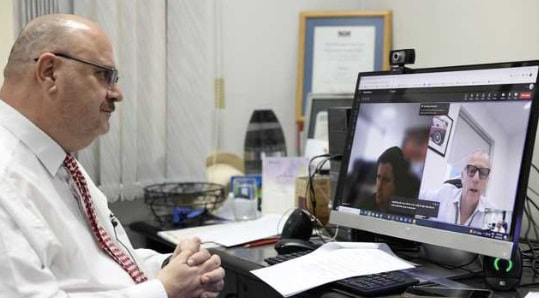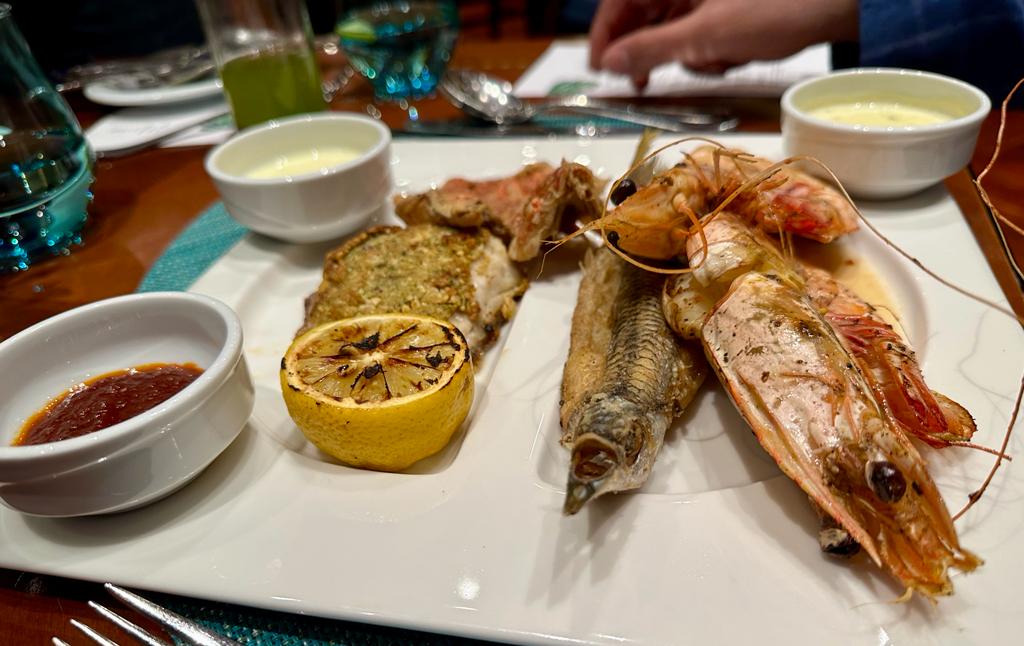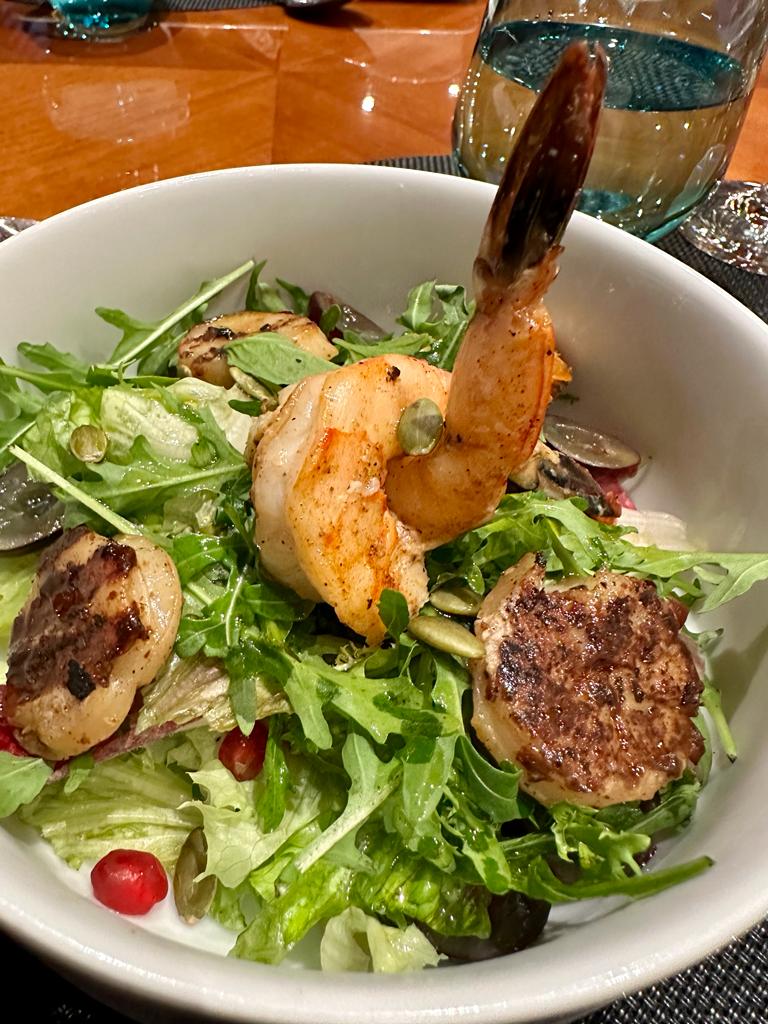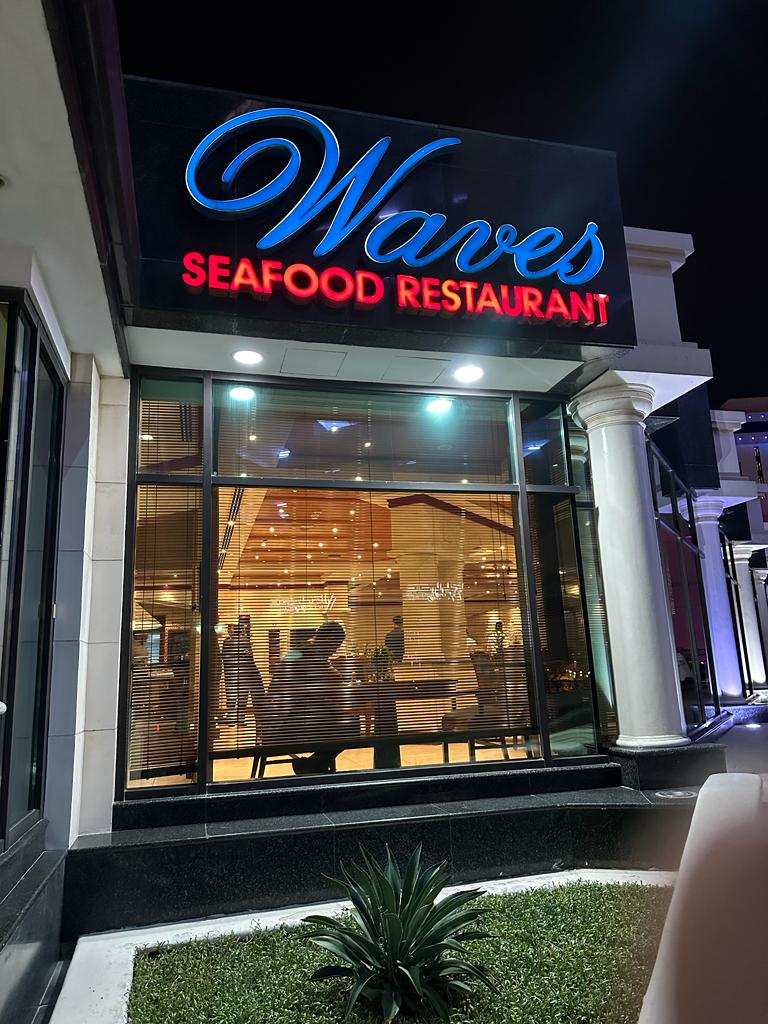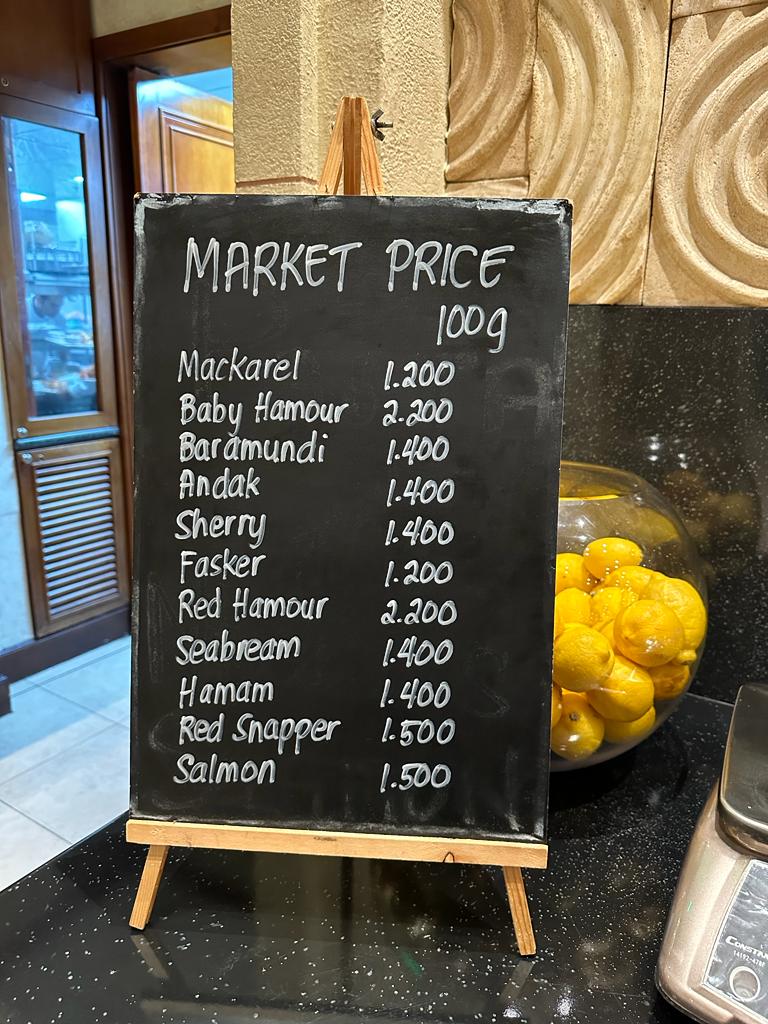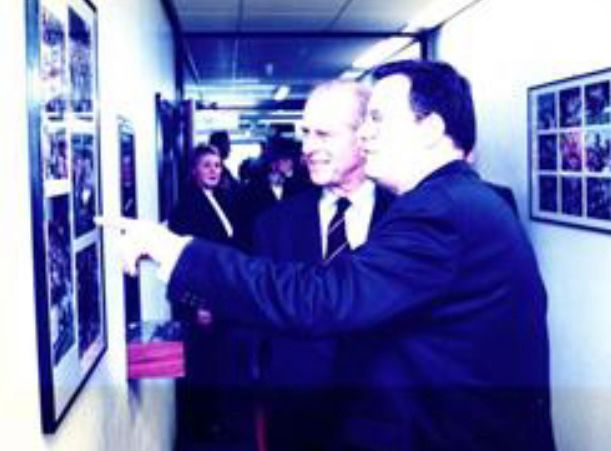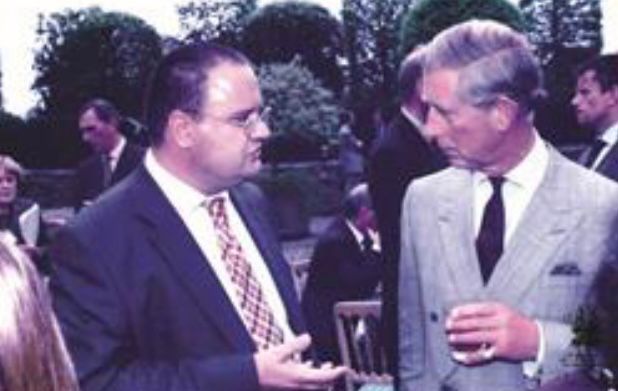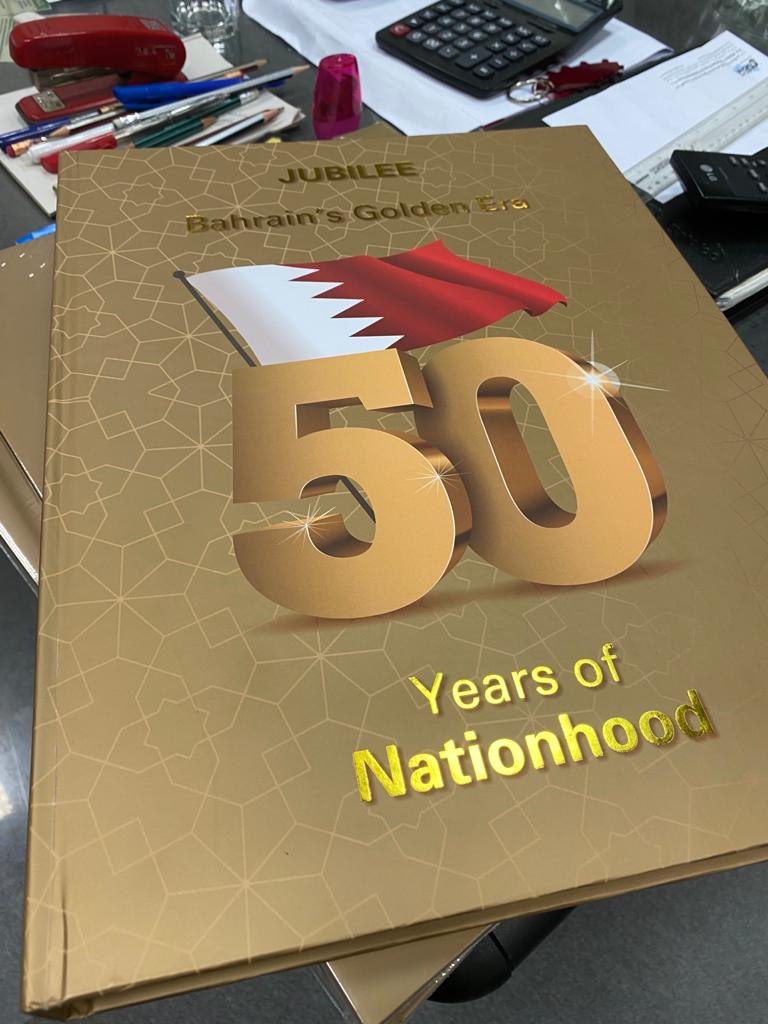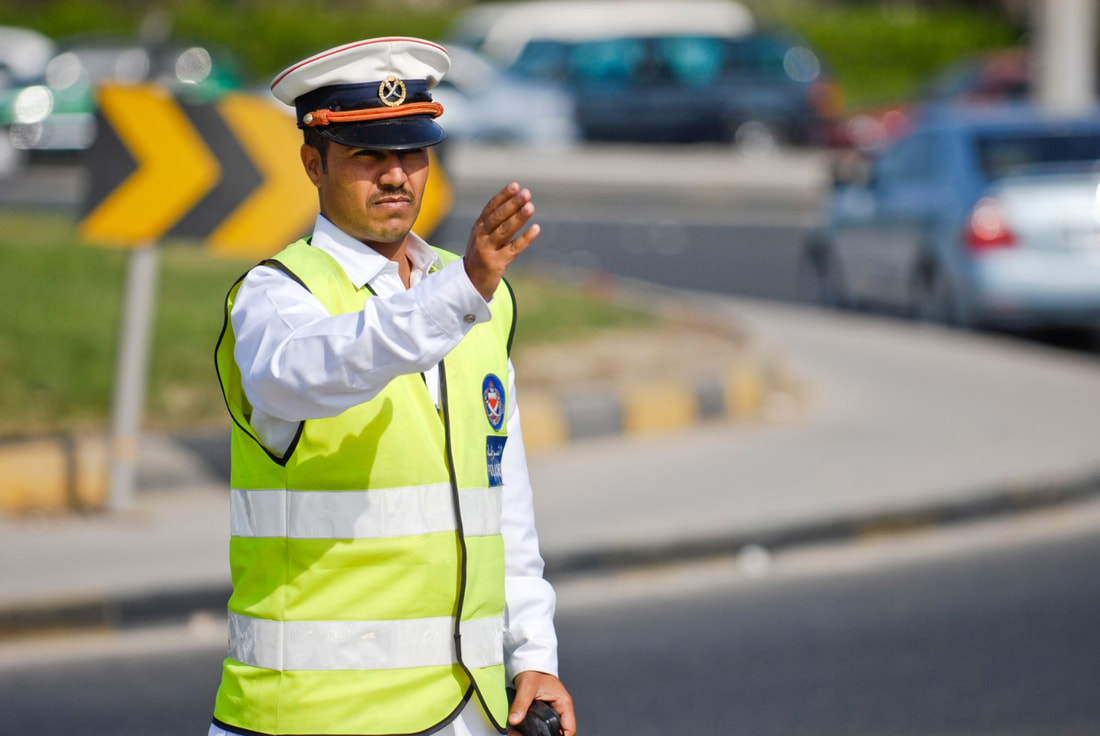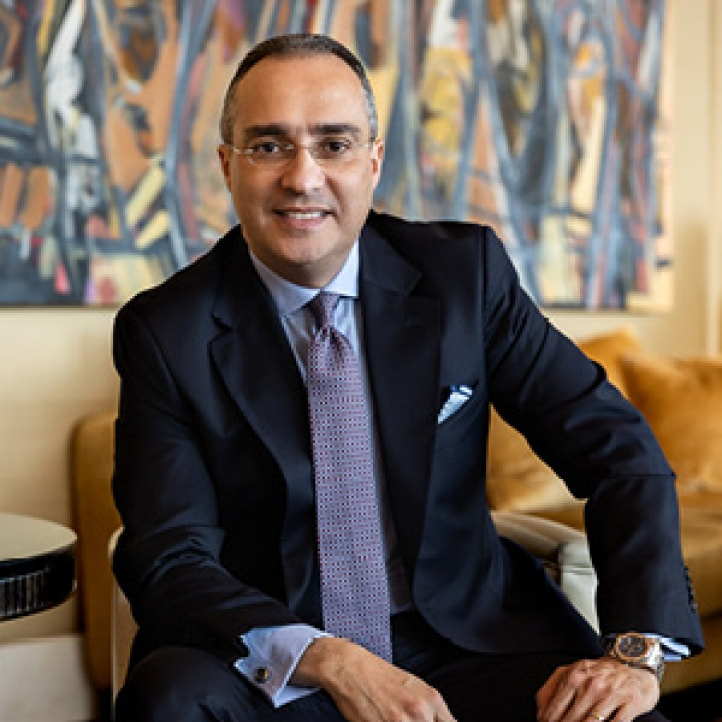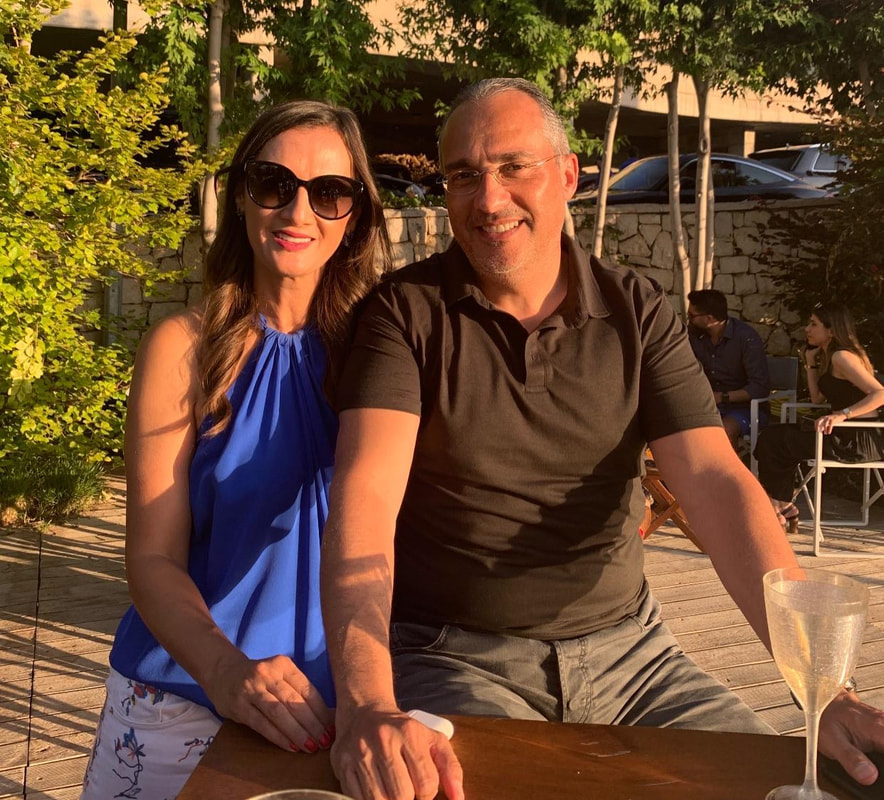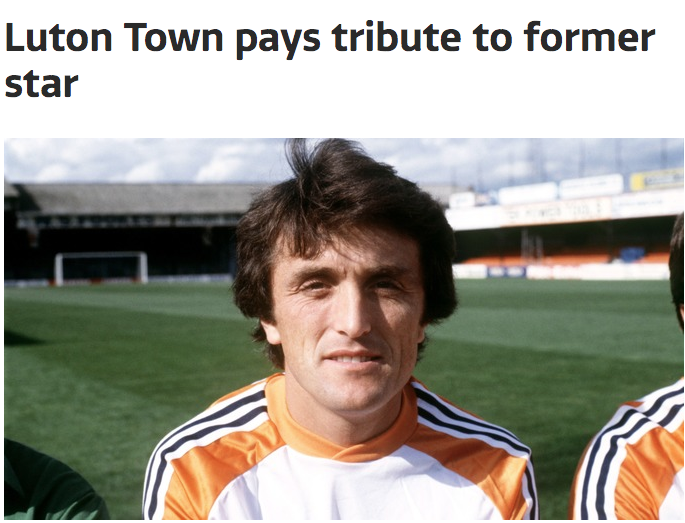|
#media #rotary #bahrain #gdn
Media matters were the focus of attention at the Rotary Club of Salmaniya’s weekly lunchtime meeting at the Golden Tulip Hotel yesterday. Welcomed by the club’s president Khalid AlQoud, GDN Media’s managing editor Stanley Szecowka, magazine publishers George Middleton and Nick Cooksey and editor/public relations manager Raji Unnikrishnan were invited to discuss the sector’s challenges and future. Mr Szecowka highlighted the GDN’s standing in the community as a trusted and valued source of local and international news in print, online and on social media platforms. “Our new strategy of welcoming media sponsors Al Haddad Motors, Solidarity and American Mission Hospital and other partners will ensure the kingdom has a thriving English-language national daily news operation today and in the future,” he added. l If you would like to find out about reaching our 500,000 readers, online visitors, social media followers and connections, email hilalpmg @tradearabia.net or [email protected]
0 Comments
To quote Miller Barber: “I don’t say my golf game is bad; but if I grew tomatoes they’d come up sliced.”
Anyone who has had the misfortune to play with me will take into consideration that I am keen but not naturally talented when it comes to the sport. I have always been a huge fan of the Royal Golf Club’s (RGC) nine-hole Wee Monty because it’s such a joy to play and perfect for a couple of hours of fun with friends, before a hearty breakfast at Café T and a day in the office. I always considered the 18-hole big course would be better suited for, well, the better players, and shied away for fear of embarrassing myself once again as I wandered around in search of my lost balls. The RGC’s head of Golf Operations, Sam Hobday, however, convinced me to give it another chance and test the recent well-documented improvements for myself. He insisted that the course changes had made it more enjoyable and playable for all level of players of the great game. It would have been rude of me to decline the offer as I’d press-ganged his parents, Barry and Sarah, to play with me in the GDN Media team at the recent AMH Island Classic as last minute replacements and we had such a fun time. I had also followed young Sam’s career with great interest as I first wrote about his sporting prowess back in 2010 when more than 70 youngsters competed in the Royal Golf Club Junior Open that saw the then 16-year old St Christopher’s School pupil clinch the overall title with a gross score of 80. He moved to Bahrain in 1997, went through the collegiate system in the United States, before returning to Bahrain and becoming a professional golfer in 2016. Whilst ambassador to the RGC, in January 2017 as a touring professional he played many different golf tours all over the world before joining the Troon family at the Riffa Views facility just months before the course was set to start on a whole new journey as an international attraction once again. As reported in the GDN, The DP World Tour is set to return to the kingdom for the first time in 13 years with the Bahrain Championship scheduled to take place at RGC from February 1 to 4. Its greens, fairways and bunkers have undergone an extensive redesign and overhaul that took almost seven months to complete. Its partial course facelift was sculpted by leading European designers and carried out by the best project companies in the world, and it is more than ready to provide some of the biggest names in golf, such as former Ryder Cup Captain Thomas Bjorn, a truly world-class experience, general manager Juan Manuel Fuentes, earlier told the GDN in an exclusive interview. The proof is in the pudding, so they say, or perhaps in these circumstances, the putting would be more apt! The front nine greens are fantastic and the whole course is currently looking particularly lush. The construction work has resulted in reduced contouring, raising and levelling of the greens to create more pin positions to make for a fairer game, less hard for the new or occasional player but still challenging for the professionals. Jamie Faulkner, the director of agronomy, deserves a well-earned pat on the back and when our paths crossed he was inspecting the bunkers shining in the sunshine and glistening in comparison to the greenery of the fairways and picturesque surroundings. For someone known to spend a fair degree of time in them, I can guarantee the crushed marble is going to look stunning on camera when the world watches the Bahrain Championship action on the small screen from afar, as well as those lucky locals securing free tickets to watch it in person. Talking of action, Sam and I were playing Pairs Scramble in advance of the National Day competition featuring members and guests competing in teams each consisting of a Bahraini and an expat. Apparently, the only difference between a golfer and an angler is that when a golfer lies, he does not have to bring anything home to prove it. I almost had rock solid evidence ... I emphasise the word almost. I played a blinding 15-foot putt on the third hole, seconds before our videographer arrived. He had been delayed by a traffic snarl-up near Sitra and missed my magic moment but Sam was there to witness a fine piece of play after complimenting one of my drives, no less. Of course, Sam’s golden chip on Hole 6 was captured in all its glory and no doubt the video evidence will go viral once we post it on social media. However, I now proudly possess a completed card showing 3-Under, yes I repeat 3-Under, at the Royal Golf Club’s championship course. I’m going to get it framed. Forget about your last round, today is the one that counts. [email protected] I’m finally a fully-fledged member of the Chaine gang after being a guest of members at a variety of dinners staged at some of the most exclusive fine dining restaurants in the world … all with a united desire to deliver the very best in eating out experiences. With decades of reviewing good and not so good eateries, I’ve been fortune to have met and befriended some fine chefs including Wolfgang Puck, Vineet Bhatia, Brian Becher, Yann Lejard, Imad Boukly Hasan, David Miras and Tala Bashmi to name but a few, and tasted some the most sensational cuisines ever placed on a plate. And, sometimes it’s not all about the food. I once penned an eating out review at a five star restaurant and concentrated on the service provided by the then ‘acting captain’ John Musyoka. I suggested he would one day become the admiral of the Four Seasons fleet and, sure enough, he ended up managing, not one, but two outlets. It’s all about the passion. For the uniniated The Confrérie de la Chaîne des Rôtisseurs is an international gastronomic society founded in Paris in 1950 - the oldest and largest food and wine society in the world. The society is vintage in more ways than one but its events are cutting edge. Members include gourmands, gourmets, gastronomes, chefs, restaurateurs, hoteliers, oenologists, winery owners, sommeliers, food and wine educators, and others interested in the finest of dining and life experiences and enjoying the camaraderie of friends at dinners and events. The tradition of the royal guild of goose roasters of 1248 was revived in Paris in 1950, and we now carry on those traditions. FORMULA One is on the fast track to further success with sell-out circuits, record-breaking numbers of small screen big race worshippers and major automobile marques queuing up to join in the action under the guidance of its president and chief executive officer Stefano Domenicali.
The F1 bonanza is also boasting a growing galaxy of Netflix-generated younger fans, leading a charge towards sustainable racing, as well as tackling the thorny issues of gender balance in the sport alongside human rights. It’s no wonder Mr Domenicali was too busy to see the GDN’s managing editor face-to-face despite his team making the first approach of suggesting an interview with F1’s main man, who apparently only gives one journalist per country, per race, the pleasure of his company … well almost. After suggested dates came and went and even the offer of a coffee at Fuddruckers in Sakhir or chat over breakfast at a hotel was snubbed, a 30-minute Microsoft Teams video conferencing session was scheduled instead. It seemed a little strange, post-Covid to get the office computer all set up again with microphone and camera for an interview with someone a maximum of a 30-minute drive away? But Mr Domenicali, who took over the Liberty Media F1 hotspot in 2021, is a very busy man. He also radiates infectious enthusiasm, portraying a profound love of the sport, drive, ambition and the pressure he puts on himself and his team became apparent in the 20-odd minutes (I’ll come to the right royal reason later) we talked online. Perhaps, if we’d been in the same room, it may have been necessary to don a precautionary passion-protecting face mask. “You can be sure of one thing, we don’t sleep a lot in the night,” said Mr Domenicali. “We always have something. I am pushing my team to be aggressive with ideas and not to be shy and then it’s up to us to decide if it’s the right thing to do. “We are an organisation that wants to keep growing and we want to keep pushing and we want to keep changing.” Embracing change is clearly the mantra. Criticism over the sport being too male-dominated has been addressed in recent days. And, plans are afoot to attract more people of colour into the sector. Formula 1 has announced Susie Wolff MBE as the managing director of the F1 Academy category, which aims to develop and prepare young female drivers to progress to higher levels of competition. Announced in November, F1 Academy is an all-female driver series featuring five teams with Ms Wolff, a British former professional racing driver, brought in to enhance the managerial structure and offer her unique insight. She will report directly to Mr Domenicali, spearheading the development of female motorsport talent and focusing on creating a successful pathway to higher categories in the F1 pyramid. “On the track we have launched the F1 Academy, an all-female series which will kick off this year with 15 drivers, seven events and 21 races, as well as significant testing time,” he said, elaborating on the initiative. “Just this week we appointed Susie Wolff – the former William test driver and Formula E Team Principal – to run the project and we are subsidising each team entry with $300,000 per driver, significantly reducing the financial burden on drivers. “Across our organisation, we have several initiatives to increase diversity, including scholarship programmes, engineering apprenticeships and our F1 in Schools programme, designed to inspire school children into careers in science, technology, engineering and mathematics. These changes do not happen overnight, but we are committed to them and have structures in place to succeed.” The green crusade is high on the agenda too. When Formula 1 cars take to the track in 2026, they will do so powered by carbon-neutral synthetic fuels, part of the sport’s ‘net zero by 2030’ plan and clearly advertised off-track at Bahrain International Circuit with several ‘on message’ displays. “We are strong in our position, from a technological point of view,” he said, “by choice we have taken to embrace being net zero by 2030 and having sustainable fuel by 2026. “By the way, this is already happening in Formula 2 and Formula 3 this year.” He’s correct, there is a well-documented history of technology transfer between F1 racing efforts and road cars. A paddle shifted transmission first appeared on Ferrari’s F1 car back in 1988 and subsequently went on to win its debut race, motorsport.com reported. Within a few years this design became the norm for F1, and by 1997, Ferrari was offering electro-hydraulically-controlled paddle shifters on the road-going 355. Not long after, the automaker also pioneered the use of diamond-like carbon (DLC) coatings to reduce friction (and in turn, parasitic power loss) in its F1 engines, an innovation that was later introduced in the 458 Italia production car. Both technologies are now commonplace in production vehicles. The message that F1 might know what it is doing appears to have been realised by politicians too with the European Union perhaps backtracking on its pledge to fast forward electrification. Other global leaders have voiced concern that they might not be able to plug in as fast as they first thought with a planet-saving battery-powered motoring option. “The world of mobility cannot go with one solution alone, it’s not possible,” he added. “We are serious in pushing through Formula 1 a solution that will be much more effective in a world where there will be more than two billion vehicles with an internal combustion engine … on top of that commercial trucks, ships and planes. “I think we are going to push for a solution that will be complementary to electrification and very effective in the future. “As has always been the case, we have been the technical facilitator for new things – what’s happening in Formula 1 will later be applied to the normal car industry. “In this situation, that is why a lot of manufacturers are interested in becoming involved, the technology that is coming into Formula 1 will give them other opportunities to develop their businesses in the field.” One of the rumours circulating around the Formula 1 world was confirmed in recent days, as Ford announced a return to the sport for the 2026 season, in a partnership with Red Bull Racing. “Ford has a great history with Formula 1, it’s just incredible news,” he said. “Over the last few decades we have seen manufactures coming and going and now we have a situation where all the major ones want to be in Formula 1 and want to invest in it. “That means the technological choices we are making are taking us in the right direction.” Mr Domenicali also recently received compliments from a correspondent writing for the British Guardian newspaper, whose readers were once described by a former editor of mine as cardigan-wearing leftie teachers who queue for rapidly-wilting organic broccoli, and a publication renowned for publishing ill-informed and pathetic anti-Gulf States whinging from people with a grudge. Writer Giles Richards said it was ‘hard to doubt the sincerity of the Italian’s belief that racing really is about more than money, that F1 can make a difference and that it will do, as he puts it, the right thing’. “People who know me, know I am not able to say things I don’t believe in,” outlined Mr Domenicali. “I totally believe in the soft power of the sport to communicate the right values around the world. “When we go into different communities, with different cultures, it is a sign of respect to share our vision and understand that certain cultural changes take time. “What we want to be is ‘effective’. I think the power of sport will bring the right attention to certain values which society of today is keen to discuss.” The proof is in the pudding. The season once again kicks off in Bahrain and will conclude in Abu Dhabi, with Saudi Arabia and Qatar getting a bowl full of action too. “It was a clear choice to not have all the races in the Middle East in one go, commercially that would be wrong and tactically too,” said Mr Domenicali. “It shows once again that the Middle East has a very important position in the World Championship – we are starting and finishing here. It’s a statement on how Formula 1 and the region both have an important role to play in the world of sport.” And, the future looks bright with the race game growing the next generation of fans. Fifty-seven per cent of US adults, for example, who identified as fans of Formula 1 said they became fans within the past five years, including 26pc who said they became fans in the past year. Among fans between the ages of 18 and 34, 42pc said they came on board in the past year and many Internet search engines suggest this is down to ‘The Netflix’ effect. The fifth season of the documentary-style popular series Formula 1: Drive to Survive show has just been released on the streaming platform, produced in a collaboration between Netflix and Formula 1, to give a behind-the-scenes look at the drivers and races of the Formula 1 World Championship. Technology is also playing a part with ‘driver’s view’ cameras on the Bell in Bahrain manufactured helmets making fabulous viewing during the live TV screening. And, on the track sprints to win positions on the grid add to the live action, although that’s still to come to Bahrain. “The communication is magic and this is a new way of talking about Formula 1,” added Mr Domenicali. “And, everything is connected to what’s happening on the track, such as introducing sprint weekend races – something that has been positively received by promoters and TV broadcasters. “It’s all about coming up with new ideas and we want to keep the pressure on, and keep new ideas at the centre of our agenda. We are talking about sport and we are talking about exciting racing on the track.” At that point Mr Domenicali had to suddenly break off from the interview following the arrival of His Royal Highness Prince Salman bin Hamad Al Khalifa, Crown Prince and Prime Minister, at Bahrain International Circuit. He made his excuses and left. It would have been nice to throw a few personal questions his way to find out what makes the man tick off the track and out of the office, such as how does a very busy father-of-two jetsetter solve the home life / work balance? But he had to run, as you can’t keep an even busier royal champion of the sport waiting. Kudos to the gentleman, he knows how to keep a promise and responded to my last questions later by email. STEFANO DOMENICALI FACT FILE HE began his latest F1 role in January 2021 taking over from Chase Carey, now non-executive chairman. After studying business administration at the University of Bologna he began his professional career in 1991 with Ferrari. Legend has it that his love of fast cars started in his childhood when he frequently visited a nearby race track, where he later assisted in the paddock and media centre. Like most small boys he had a collection of toy cars and confirmed his favourite was, of course, coloured ‘Ferrari red’. Mr Domenicali held various positions at the acclaimed Italian racing giant, including heading up the Direzione Sportiva F1 from 2004, before becoming Team Principal for the Formula 1 team in 2008. From 2009 to 2014, Domenicali represented Ferrari in the FIA World Motor Sport Council. He was also vice president of New Business Initiatives at AUDI AG from November 2014 before moving to Lamborghini in March 2016 as chairman and CEO. Married to Silvia, the daughter of famous F1 photographer Ercole Colombo. They have two children, Martino and Viola. “I live in London, where Formula 1 is based, but with a 23-race calendar I, of course, travel a lot. When I go ‘home’ I live in Monza close to the track,” he told the GDN. “The work is very intense with early starts and long days. I like to run when home and use the gym when I am away and I also always try to find the time to walk the track with my team at every race. When I get away from work it is always time with family and friends. “I want my children to find their own passions for things and not be forced by what I do. They come to some of the races and really like the sport and the drivers.” There’s a five-star hotel restaurant making waves in the kingdom for all the right reasons and there’s no catch, the chefs conjure up seafood delights to order and the choice of cooking style is open for discussion.
Waves restaurant at the Crowne Plaza, Bahrain is now back in the business of delighting diners after the hospitality perils of the pandemic and has returned to the popular ‘market place’ concept of displaying the offerings on packs of ice surrounded by displays of fresh market vegetables. It’s a tried and trusted formula and guaranteed to make the taste buds start to tingle as the eyes capture the colours and the quality of the catch of fish. The conductors of the seafood show are recently-arrived Chef Azreen Mumin, the hotel’s Chef De Cuisine, and Waves’ Executive Sous Chef Angad Amar Sawant, supported by their kitchen teams. They delivered a dynamic special menu for last week’s launch party, a little taster of even greater things to come. The starter Seafood Salad featured a marvellous mesclun mix - mesclun is a Provençal word that describes a mix of tender salad greens and herbs. Alongside the mixture of young tender leaves were prawn, scallops, pomegranate, avocado, pumpkin seeds, sweet basil and Evoo – an extra virgin olive oil that must be free from any alterations in colour, taste, nutrients or vitamins. You could feel the goodness in every mouthful. The star turn, in my humble opinion - controversially as it seems - was the soup that followed. A Prawns Pistou Soup with crispy vegetables, rouille and croutons was simply stunning. As I mentioned earlier in this review, the sight senses were teased by the seafood market display. Well, this time, it was texture and flavour in a taste sensory overload. The prawns floating in the fish soupy waters were suddenly given a crunchy explosion when the perfectly prepared small vegetable pieces were bitten into. A masterpiece of culinary perfection as far as I am concerned, however, according to my new-found best friend chefs, the reaction on the night was mixed. The guests appeared 50-50 in a love-hate relationship with the soup. I’m a lover and I shall return to Waves on the basis of being able to sample this superb offering once again. The Main Course was a Waves Fisherman’s Platter, well presented on the plate and cooked to perfection. This is no easy task. I have visited countless seafood restaurants during my years as a restaurant reviewer here in Bahrain and back in the UK, and it is very, very easy to get it wrong. I went to one outlet and found my chosen fish swimming in a sickly buttery sewer of sadness. When I complained and suggested they leave it to the customer to choose how much sauce to put on the plate, the waiter shrugged his shoulders and said: ‘That’s the way we do it’. Well, matey boy, the proper way to do it is the Waves way. The accompanying sambal, tartare and lemon butter sauces came in separate pots and the customer, rightly, was allowed to make the decision on how much to add, or not, as the case may be. And, that is what makes Waves better than most. The whole concept is geared around the diner. The market prices are clearly displayed, alongside the choice of sauces and even the cooking method can be chosen from deep fried, grilled or baked. Back to the food, the prawns were perfect once again, Needle fish, Red Mullet and my favourite crusted hammour fillet sat happily amid the mix salad. Light, fresh and surprisingly, absolutely, filling. There was little room for desserts, but I forced myself to bite into the Ginger Crème Brulee, knowing full well that the good lady wife, Kathryn, back home in the UK looking after her aging father, would have savoured the flavour. I sent her a photograph and a ‘wish you were here’ WhatsApp message. The vanilla icecream and sprinkled crumble hit the spot too. The hotel’s general manager Charbel Hanna said that Waves had always been ‘famous for being Bahrain’s finest and freshest seafood restaurant’ and he added that the restaurant’s team ‘could not wait to get back to serving guests again’. I waved goodbye to the staff after a wonderful night of enjoying creative cuisine alongside traditional favourites and it will not be long before the tide brings this faithful scribe back for more. I called home shortly after hearing the breaking news that Her Majesty the Queen had passed away. The good lady wife, Kathryn, who is caring for her aging father in a village just a short drive from the northern English city of Hull was too choked up to speak to me.
The following day, I touched base with Al Hilal’s managing director Ronnie Middleton who was visiting family back in the UK and he said that his wife, Joyce, was in tears too. We were all rocked, at home and those of us Brits living and working abroad. We loved the Queen and we will remember her. Fortunately, I had the pleasure of meeting Her Majesty on two occasions. One of the joys of being a journalist is that I have been blessed with the opportunity of mixing in circles I would never have dreamt of as a child growing up on a council estate in the East End of London. During my time as community and campaigns editor of the Hull Daily Mail I was involved in the organising committee for the royal visit to celebrate the 700th anniversary of the city becoming a ‘kings-town’ … its actual title is Kingston upon Hull. It was 1999 and as the world prepared to celebrate the upcoming new century, Hull decided to have its party a year early. My job was to accompany the Duke of Edinburgh around the offices of the historic publication, it has been circulated in various guises since 1885. It was a simple task and to make it easy for me, carpet panels had been lifted and replaced with bright red ones on the route we had to take. The rehearsal went well but on the day my profoundly bad sense of direction got the better of me. The late Duke had a tough persona, did not suffer fools gladly and had a reputation of not being a great fan of the media, so I was understandably nervous. The rumours were nonsense, we got on like a house on fire as soon as he spotted one of our rugby action images on the wall. Hull FC had played arch-rivals Hull Kingston Rovers in the Challenge Cup Final at Wembley. Legend has it that one of the bridges leading out of the city sported a message requesting the last person out the city to switch off the lights. As we chatted about sport we wandered off towards the office canteen and the Duke stopped me suddenly and said: “Stanley, do you think we should be following the red carpet?” Later, at a special reception at the city council offices, I was introduced to Her Majesty the Queen. She asked me who I was and what I did for a living and I explained that today my job was to look after her husband and that I’d almost messed up doing that. I explained that I had been worried about the Duke’s reputation but had found him absolutely charming and kind. She laughed, sympathised with my red carpet mix-up and told me, with a smile, that the Duke ‘was not all bad’. She knew, she loved him and now joins him in heaven. A few years later, Kathryn and I were invited by Her Majesty to a Garden Party at Buckingham Palace. The cucumber sandwiches were sensational. The Royal Family members were warm and welcoming and the memory of the occasion will live in our hearts forever. At that time, I was deputy editor of the Bristol Evening Post, later launched my own weekly publication The Clifton Chronicle and my business dealings and community endeavours in the city resulted in several meetings with His Highness The Prince of Wales. He was charming and invited me to a reception at The Orchard Room, Highgrove House. It is the family residence of King Charles III and Camilla, Queen Consort of the United Kingdom. We talked about families, communities, the environment and business matters. He was visionary, well informed and truly inspiring. God Save the King. Stanley Szecowka, Managing Editor, GDN Media It’s only a little island, there are only a few highways, it won’t take long to find your way around, or so you would think. That depends, of course, if you have a good sense of direction and you’re quick-witted enough to take that turn in 200 metres as instructed by the lady on your Google Map app … no, not that right, the one after … as you end up on a busy back street in Um Al’ Hassam, or worse still, on the edge of Manama souq. I was lucky when I first arrived in the Kingdom of Bahrain in 2007 because there was a towering florescent light proudly sitting on top of the Gulf Hotel. If I could make my way from Hoora in the direction of Adliya and the shiny sign I could find my way home, otherwise I got lost. It appeared that every sign – north, south, east and west – pointed either to the Bahrain International Circuit or Saudi Arabia and for many months I took the long way home to Saar, terrified of the driving habits of locals, crazed fellow expats and the weekend visitors. The roundabouts were a fun experience too … Burgerland, in particular, was a case of a quick prayer and hoping you’d get in the right lane without a prang. I used to marvel at the policemen who swung their arms magnificently conducting the traffic and introducing calm to the chaos … but now I’m getting nostalgic as the police are no longer needed, most of the roundabouts are now junctions with helpful blinking green lights indicating in advance when it’s time to stop. By the time the sign from the Gulf Hotel came down after a major refurbishment I was fortunately more knowledgeable and starting to complain – even taking the direct route – about how far it was to Amwaj Islands or Sakhir in the other direction! Shocking really, this was a man who used to be regularly stuck in a queue for two hours or more to travel15 miles from north to south of an English city and not think anything of it. That’s progress and that’s one thing Bahrain can be proud of … this tiny country continues to invest in its infrastructure and, for someone who has only witnessed around a decade and a half of change, the roads network has improved immensely and still the investment continues apace. It’s been a privilege to witness the changes and to play a part in reporting on and recording the country’s progress in print, online and on social media. Thankfully, I’ve been able to draw on 40 years of journalistic experience to help me navigate a new environment and a country I now call home. It’s been a place which my youngest children still consider as their favourite place of residence having ridden horses, played football, gone to school and lived a privileged life in a safe and secure environment. I happily boast to my friends back in the UK that I could confidently walk with my family through any neighbourhood – city, town or village – at any time of day or night in the Kingdom of Bahrain in the full knowledge that not even the thought of danger would enter my head. You couldn’t say the same about London, Bristol or Hull – cities I know extremely well - and having spoken to many American expatriate acquaintances, you’d need to book an appointment with a psychiatrist for even considering stepping into some districts in their home country. No doubt I’ve ruffled a few feathers over the years, but then any journalist worth his salt is bound to do that at times, however, I like to think that the GDN has been able to be not only ‘the voice of Bahrain’ but its champion. If it’s good for Bahrain, it’s good for the GDN and if it’s good for the GDN, it’s good for my team of journalists. My working philosophy hasn’t changed from the first time I professionally picked up a pen on my first working day at the office of a small town newspaper as a raw, keen and eager trainee reporter in 1976. It’s simple; always be willing to come face-to-face with the person you’ve written about the next day. It made sense. If you upset someone not only would the complainant lambast your editor … he’d also call your mum! That’s not what many scribes on national newspapers in the UK or other Western countries need to think about. They can publish and be damned and roll on to the next community to disrupt, cause havoc and leave a trail of tears. Bahrain, although a thriving, dynamic country, also has a unique family-focussed small town feel it must, forever, embrace. It’s what makes it the number one destination for expatriate workers and keeps its young nationals fully focussed and determined to achieve great things in the future. You may not know everyone you pass in a mall, coffee shop, hotel restaurant or office elevator but you’re sure to know someone, who knows someone, who does. This came home to me recently when covering an incident on the runway of a Gulf Air flight to Kuwait. It made an emergency stop and its passengers had to evacuate the aircraft down the emergency slides. There were only 62 passengers onboard but, of course, a friend of a friend, knew one of them. I called him at his hotel room and the 49-year-old banker was happy to talk about his experience to the GDN, because it was a newspaper he could trust and a newspaper that had been a part of his life since his childhood. We’re going to meet face-to-face for a coffee shortly. That’s what you do in Bahrain. Bahrainis have been warm and welcoming to the Szecowka family both personally and professionally. The joys of working and living in this country are world-renowned. It’s a melting pot of cultures and people of all colours and creeds work together to make this country shine. Fifty years of independence, 50 years of stunning developments and achievements as this book so clearly outlines. What a keepsake and what a country. Congratulations and thank you, Bahrain. WITH the hospitality sector globally reeling from measures introduced to help fight the pandemic, few people would relish stepping in to take over the reins of a property, no matter how distinguished its name or desirable its setting.
Add that to taking on an additional expansive regional role and you might be concerned about the man’s sanity. But Rami Sayess, who celebrated his 53rd birthday on Wednesday, is crazy about his latest appointment, crazy about being back in Bahrain and crazy about the career he loves and the prospects unfolding. Unsurprisingly, little should faze the hospitality hotshot after the year he has had coping with civil unrest, revolution, Covid-19, currency devaluation and culminating with the tragic August 4 port blast causing his property to close down for restoration. “Following three-and-a-half extremely successful years in Beirut during which the hotel achieved record results, the past 15 months were beyond challenging due to the reasons mentioned,” he admitted. “The hardest part to deal with was having to say goodbye to so many amazing colleagues which was a huge loss not only for Four Seasons but the destination as a whole. Our people are our greatest asset and because of them I managed to cope with the sequence of crisis that Lebanon went through, they were my backbone and without them I wouldn’t be where I am today! “I’ve always been very clear about my objectives: take one step at a time, do your best in whatever position you are in and enjoy whatever it is you are doing.” His latest role is regional vice-president and general manager at Four Seasons Hotel Bahrain Bay, taking over the reins from Richard Raab who has been sent to Russia with love, transferred to Four Seasons Hotel Lion Palace St Petersburg as GM after three years driving the successful launch of the hotel’s private beach, waterpark and additional leisure facilities. With a proven track record in the hospitality industry, specifically with Four Seasons over the past 15 years, Mr Sayess will be based in Bahrain with regional responsibilities overseeing several Four Seasons hotels and resorts in Europe, the Middle East and Africa (EMEA) region. “I have been in this position (regional vice-president and GM) for the past 10 years,” he said. “Initially in Bangkok overseeing our four hotels and resort in Thailand, then Qatar before moving to Lebanon and now Bahrain. “Since I moved back to the Middle East in 2013 I have been overseeing a number of Four Seasons Hotels & Resorts within the EMEA region and this will continue to be the case while based in Bahrain. In addition, to my position as GM at Four Seasons Hotel Bahrain Bay, my regional responsibility currently covers the following countries: Mauritius Island, Tunis, Saudi Arabia, Kuwait, Qatar, Lebanon as well as several hotels in the pipeline within the region.” He is also in charge of recruiting graduates from hotel schools in Europe to be placed at the group’s hotels and resorts around the world, identifying the ‘leaders of the future’. His own potential was spotted early ... by his late father. “His name was Zaki which means intelligent in Arabic, and he certainly was!” Mr Sayess said. “A self-made man who introduced the travel industry in the South of Lebanon by opening the very first travel agency there in the early 1960s. “Through our travels during the years, my dad always noticed how much I enjoyed staying in hotels around the world and the questions I used to ask about how hotels operate, hence his instinct of guiding me towards this profession.” His younger years were certainly full of travel. He spent his first 17 years mostly in Lebanon with a few stints abroad in Syria, Cyprus, Czech Republic and the UK – moving four times during the war in Lebanon. “What was that like? I didn’t know anything different and we had no choice of moving each time the war broke close to home,” he said. “I guess this made me more intrigued to travel even more and learn new cultures whenever an opportunity presented itself. Of course, this comes at a cost, getting used to new surroundings, making new friends, proving yourself again, changing schools etc., ... but at the same time this was an advantage of preparing me for the future that I had no idea about then!” He was recently interviewed by Les Roches, the famed private hospitality school located in Switzerland, for a student article, and the class of 1990 graduate was described as the ‘hotelier’s hotelier’. Asked who had made the biggest impact on his professional career, he replied: “My dad for sure. He suggested the idea of ‘hotel management’ to me and followed my career step-by-step until he passed away in 2005, the year I joined Four Seasons. That was a poignant moment, since it was a goal he had set for me back in 1987 when I started at Les Roches.” Although Lebanese born he is also a British citizen and is married to Brit Mary Brown, who he describes as ‘forever young at heart and a role model to three lovely children’. Love was in the air from the moment they met. As the box office film title suggests ‘There’s Something About Mary!’ “I took the right flight from London to Dubai and was lucky to sit next to this gorgeous lady who eventually became my wife,” he said. “Since then I never talk to ladies on flights ... too dangerous!” The frequent traveller lifestyle of the sector has given their children a taste of the world too. Maher, 22, will be graduating this summer from City University in London (Mechanical Engineering). Mazen, 19, is following in his dad’s footsteps and is in his first year at Les Roches. Mazen was born in Bahrain while dad was working at Le Royal Meridien Hotel, now the arch-rival Ritz-Carlton, Bahrain, as hotel manager between 2000 and 2002. Daughter Lara, turning 16 this summer, has joined Grade 10 at Riffa Views International School. “Our children have travelled around the world and Bahrain is Lara’s sixth move!” said dad. With the family settled in the kingdom, Mr Sayess can now concentrate on the task at hand and relish the opportunity. The Four Seasons Hotel Bahrain Bay has just been recognised on Condé Nast Traveller Middle East’s 2021 Gold List, one of the hospitality industry’s most esteemed awards that honours the best hotel and resort properties around the world. The Gold List provides inspiration and authoritative critiques for discerning travellers on where to stay. As one of only nine properties in the Middle East and the only hotel in Bahrain to be featured, the recognition serves as a ‘fantastic achievement, attributed to the support of the hotel’s ownership together with the kingdom’s long-term vision of building upon its unique strengths to unlock its great potential in becoming a leisure and cultural destination of distinction’. “In the midst of an incredibly challenging time for our industry, we are humbled to be included in this esteemed list of the world’s best hotels,” said Mr Sayess. “The incredible accomplishment is a result of the collective hard work, dedication, and innovation the team continues to deliver to elevate each guest experience. “As we collectively respond to the Covid-19 pandemic, Four Seasons Hotel Bahrain Bay continues to ensure that guest, member and employee health and safety remains our top priority. “Lead With Care, our enhanced global health and safety programme which is being implemented at Four Seasons properties worldwide, leverages on world-class medical expertise through collaborations with international experts to strengthen our already stringent health and safety policies and procedures. “While the Four Seasons experience may look different, our dedicated team members are committed to delivering the same intuitive service and personalised care for which we are known and trusted for the world over. “The ones who make the difference are the people who interact with each and every guest day-in-day-out. My job is to lead, guide and support my team members to ensure they are empowered enough to give their best. Sometimes people don’t even know what potential they actually have until someone gets the best out of them, and this is my number one goal.” But will the hospitality sector ever fully recover? “We are still in the ‘learning phase’ of what the new normal might look like,” he admitted. “I personally believe that going back to how things used to be is far-fetched as, through the experiences of this past year, we discovered new ways of doing business and many cases proved even more efficient than before. “Having said that, when it comes to hospitality, nothing can replace the ‘human touch’ and personal interactions, hence, I do hope that some of what we used to do in the past will resume sooner than later. “Given the current circumstances around the world, I couldn’t think of a better place to be than Bahrain. Having two sons studying in Europe, family and friends in the US, GCC and other parts of the world, I can safely say that Bahrain would be our preferred home given the way this pandemic has been handled at the outset, thanks to the wise leadership at the top. “In addition, the renowned hospitality of the Bahraini people speaks for itself making me and my family feel right at home since our arrival in the kingdom. “I urge everyone to follow the guidelines provided by the authorities so we can protect each other and hopefully get back to our normal lives. “And, I look forward to meeting my colleagues around the city, as well as all our guests who are missing us as much as we miss them!” And, he has a few tricks up his sleeve to attract old customers back and entice new ones to visit. “We have numerous exciting additions to the property coming up which we look forward to soon announcing,” he teased. “re/ASIAN CUISINE, celebrity chef Wolfgang Puck’s restaurant on the 50th floor, is currently undergoing a transformation which is set to showcase a brand new sushi lounge serving an innovative menu in a lively setting. “Also in the pipeline is the Beach Club: a family-focused entertainment space to complement the recent addition of our kids’ waterpark and private white-sand beach. The Beach Club is a place where families can play, laugh and relax together, encapsulating the warm and convivial vibe at the heart of our hotel.” Meanwhile, old friends will soon be heading the hotel’s way. The F1 bandwagon will be arriving shortly with the new season kicking off in the kingdom with the opening race of 2021 at the end of March. The hotel is a favourite with some of the drivers and teams. The keen table tennis player and Manchester United fan is ready and waiting for Bahrain International Circuit’s sporting bonanza. “I’m looking forward to it,” he said. “The team is ready to welcome our guests back soon.” A friend of mine has posted on social media about his plans to get his first tattoo before his 60th birthday. It's on his bucket list, the same as me. For my last birthday I planned four fab things.
However, I still have it in my mind to tattoo the words SLICK (the initials of my children and good lady wife: Stan Jnr, Louis (my sons) Imogen, Charmaine (my daughters) and Kathryn (the Mrs) placed somewhere on my body. I thought it might be a nice reminder as they're all in the UK and I'm here alone in Bahrain. I mentioned this to a friend in Bristol and he innocently asked: 'Is that because you live in the Middle East?' (oil slick, gettit?) But ... I'm still not sure. One of our acquaintances, Del, has a devious plan to have his name tattooed too with strict instructions to his family to have 'eted' added on his deathbed. Now that is class. I picked up the GDN this morning and whilst flicking through the sports pages suddenly spotted a short story headlined Ex-Athletico coach Antic dies.
I knew Raddy Antic. He wasn't the easiest man to interview as his English was dreadful but he was one of the many characters who welcomed me into the crazy world of football reporting. I worked as a young journalist on the Milton Keynes Mirror and Mirror on Sunday, a 'newly-created English 'city' in Buckinghamshire, and was assigned the task of covering Luton Town, one of the nearest professional football teams, 20 miles down the M1 heading south. The alternative was covering Northampton Town, heading north up the M1, and at first I was worried I'd picked the short straw (or straw hat, I'll explain later). Luton were in the second tier of English football and the first home game I covered they were thrashed 3-0. It looked like it was going to be a long season. In those early 1980s, footballers weren't multi-million superstars with flash agents. I interviewed the players in the dressing room after the game, played pool with them after they had showered and changed, regularly called into goalie Jake Findlay's home for coffee and a chat as he lived in Milton Keynes, and coach David Pleat was warm and welcoming and always made a bee-line to say hello, especially when I travelled to away games. The only 'special one' was Raddy Antic. He drove a really flash executive limo to the training ground, much better than the ones owned by the other players and probably the board of directors too. There were rumours he was 'well connected' with certain families from Eastern Europe with a nod and a wink. After that first loss, the Hatters, as they were nicknamed because of the town's historical connection with the hat making trade and a variant on the now rarely seen straw-plaiters, rarely lost a game again. An incredible run of victories saw them promoted to the top league. It was an amazing footballing journey. And the Serbian, who played for Yugoslavia internationally, famously kept Luton Town in the top flight with a goal against Manchester City back in 1982/83, the last game I covered before my career in journalism took me on to daily newspapers. The goal sparked scenes of utter elation as Pleat danced jubilantly on the pitch, one of football's most endearing moments. Man City only had to win or draw the game to stay safe. The loss saw them relegated instead of the Hatters. Hard to imagine that happening nowadays! Antic joined the Hatters in 1980, playing more than 100 games for the club. Incredibly, he later went on to coach Spanish giants Real Madrid, Barcelona and Atletico Madrid. Luton tweeted: "We are devastated to learn of the passing of a Town legend". RIP Radomir 'Raddy' Antic, thanks for the memories. |
Stanley Louis SzecowkaEditor/Journalist & Blogger, Restaurant & Motors Reviewer, FinTech Writer, Manager, Trainer. |
